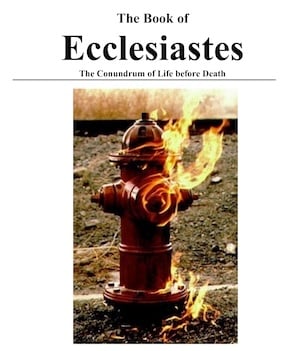
The Book of Ecclesiastes
The Hebrew title of the book of Ecclesiastes is Qoheleth, or Koheleth, meaning "Gatherer," or more traditionally, "Teacher" or "Preacher." Ecclesiastes is categorized among the 24 books of the Tanakh (Jewish Bible), as one of the Ketuvim, or "Writings." Its Greek title is the more familiar Ecclesiastes, a transliteration of the Greek letters and syllables of the original word into English. It is listed among the Wisdom Books of the Christian Old Testament, traditionally thought to be the work of King Solomon who lived in the 10th century BC.
Koheleth, the teacher, discusses the meaning of life and the best way to live it while on this earth, or as the author puts it, “under the sun.” He equates most human activity as inherently hevel, a Hebrew word describing pointless, meaninglessness. While Koheleth prefers and even encourages wisdom as a means for living a well spent life, he does not assign any meaning beyond the conscious years of one’s worldly existence. So, in view of such vanity, he suggests a person learn to enjoy the simple pleasures of daily living, such as eating, drinking, and enjoying one's work. All, of which, are the gifts of God. However, the book’s final announcement in 12:13 says to "Fear God, and keep His commandments; for that is the whole duty of all people."

